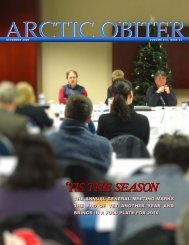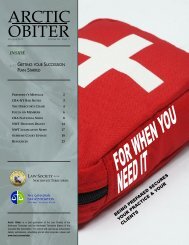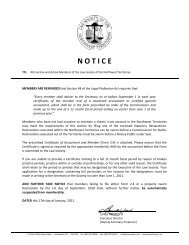ARCTIC OBITER
March/April 2013 - Law Society of the Northwest Territories
March/April 2013 - Law Society of the Northwest Territories
- No tags were found...
You also want an ePaper? Increase the reach of your titles
YUMPU automatically turns print PDFs into web optimized ePapers that Google loves.
maximum credit of 1.5 to 1 for time<br />
served in pretrial custody. The<br />
circumstances do not need to be<br />
exceptional to justify granting the<br />
more generous credit. In this case,<br />
the need to wait for the presentence<br />
report was not within the<br />
offender’s control. Unfortunately,<br />
however, it meant that during the<br />
time he was in custody awaiting<br />
that report he was not earning<br />
remission. Therefore, the offender<br />
should get enhanced credit.<br />
The offender is Aboriginal, but<br />
there was nothing presented to<br />
indicate there are systemic factors<br />
related to his Aboriginal heritage<br />
that have contributed to his being<br />
in court and which could justify a<br />
reduction in the three-year starting<br />
point.<br />
~<br />
CRIMINAL LAW – SENTENCING<br />
– AGGRAVATED ASSAULT –<br />
CONSIDERATION OF<br />
ABORIGINAL HERITAGE –<br />
ENHANCED CREDIT FOR PRE-<br />
TRIAL CUSTODY –<br />
COMPENSATION<br />
R v Green<br />
2013 NWTSC 20 (March 20, 2013)<br />
Presiding: Justice L.A. Charbonneau<br />
For the Crown: A. Godfrey<br />
For the Accused: B. Rattan<br />
The 30-year-old Aboriginal<br />
offender was sentenced to two<br />
years less a day plus three years’<br />
probation, after 2 ½ years credit for<br />
pre-trial custody, following his<br />
guilty plea to two counts of<br />
aggravated assault. While at a<br />
drinking party, the offender<br />
became angry and violently<br />
attacked a woman and her<br />
husband. The husband suffered<br />
very serious injuries. Almost 2 ½<br />
years later he has not fully<br />
recovered, and it is questionable<br />
whether or not he will ever fully<br />
recover. As a result of his injuries,<br />
the family moved to be closer to<br />
required medical care. Also as a<br />
result of his injuries, the husband<br />
can no longer work, is on social<br />
assistance, and may never again be<br />
able to work as he used to. He has<br />
not fully recovered his mental<br />
faculties. Sentencing is not about<br />
revenge, but the impact this crime<br />
had on the victims demonstrates<br />
how serious these offences were.<br />
The offender had an appalling<br />
criminal record. He had a 2007<br />
conviction for aggravated assault<br />
f o r s t a b b i n g s o m e o n e ,<br />
unprovoked, at a drinking party.<br />
The offender said he was sorry for<br />
what he did. The problem is that<br />
being sorry after the fact does not<br />
help his victims, does not protect<br />
the community, and does not<br />
address the root causes of his<br />
behaviour. Given the offender’s<br />
criminal record, the paramount<br />
consideration has to be protection<br />
of the public. The offender<br />
appears to be a ‘time bomb’. The<br />
Crown suggested the net sentence<br />
be kept under two years. A period<br />
of probation was worthwhile for<br />
the purpose of prohibiting contact<br />
with the victims.<br />
Section 718.2(e) is a remedial<br />
provision intended to address the<br />
problem of overrepresentation of<br />
Aboriginal people in Canadian<br />
jails. But for the factors related to<br />
the offender’s Aboriginal heritage,<br />
a fit sentence for this crime would<br />
be longer than 4 ½ years.<br />
The circumstances that justify<br />
enhanced credit for pre-trial<br />
custody do not have to be<br />
exceptional or rare. They do have<br />
to be applicable to the specific<br />
accused before the court. The onus<br />
to show that there should be<br />
enhanced credit rests on the<br />
accused. In this case, he has not<br />
discharged that onus.<br />
The Crown sought an order to<br />
compensate the victim for loss of<br />
income. Compensation orders are<br />
not intended to be substitutes for<br />
civil proceedings but can help<br />
achieve the objective of reparation<br />
of harm done to victims. In this<br />
case the loss is not easily<br />
quantifiable. The offender’s ability<br />
to pay was also relevant. This was<br />
not a case where a compensation<br />
26 ■ MARCH/APRIL 2013 <strong>ARCTIC</strong> <strong>OBITER</strong>
















